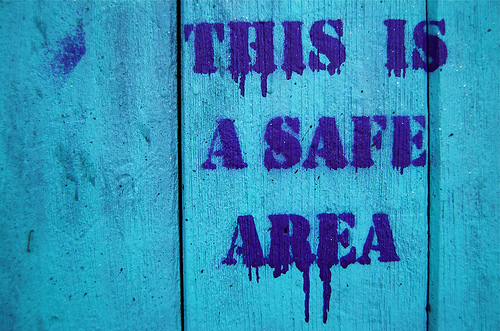What does “safety” mean to you?
To me, it is when home means security and happiness, and feeling I am where I was meant to be. Safety is relationships built on kindness and authenticity. It is anticipating tomorrow as a good day, perhaps with its own problems, but without self-induced drama or harm.
Safety is the serenity of acceptance, and being relaxed being me. But, most of all, it is feeling comfortable with God, and knowing he loves me and is looking after me.
 Deep inside, we all yearn for safety. Yet, paradoxically, many of us do things that lead us in exactly the opposite direction. It is estimated that 20-25% of Americans are in recovery from addiction. Millions more suffer from a compulsive fixation on control, anger, over-spending, workaholism, codependency, or some other issue.
Deep inside, we all yearn for safety. Yet, paradoxically, many of us do things that lead us in exactly the opposite direction. It is estimated that 20-25% of Americans are in recovery from addiction. Millions more suffer from a compulsive fixation on control, anger, over-spending, workaholism, codependency, or some other issue.
Addiction is when we repeat the same mistakes over and over again, harming ourselves and others while naively hoping for positive results.
That sounds like insanity to me.
How do we begin moving toward safety?
A decade ago, my life felt anything but safe, and drama and chaos were daily companions. 3:00 AM brought shame and fear, with little hope for a worry-free tomorrow. Staring into the darkness, I wondered if God was hearing my desperate pleas for help.
But, one by one, I worked through the obstacles keeping me from moving toward safety:
1. Unawareness – At first, I didn’t know what I didn’t know: alcohol had become a problem.
2. Denial – Addiction is terrifying; maybe that’s why I didn’t accept that reality for a while.
3. Doing nothing – Even when awareness became unavoidable and denial was no longer an option, escape and guilt remained habits for a while. I knew God wanted me to stop drinking, and that I was repeatedly choosing disobedience instead. My issue had become my idol.
Until I couldn’t bear it anymore. And, with help, I found steps that can help us move toward safety:
- Read and study, understanding it takes time to learn a new way of living.
- Practice that balance of honesty and grace that makes life what it should be.
- Surrender. Let go and let God. Put our recovery, and our life, in God’s hands.
- Talk to someone. It is a critical step, and people root for those who are trying.
- Connect with a good church and develop a small group of friends who care.
- If needed, find a counselor who can offer professional advice and accountability.
- Muster the courage, which soon becomes enjoyment, for recovery meetings.

How can we become safe for others?
With 1 in 5 Americans in recovery, the odds are high you know someone who could use your encouragement. But, how should you act if they are brave enough to let you in?
- When they talk to you, move toward them rather than away from them.
- Be supportive, let them know, and compliment their courage.
- Don’t assume you understand unless you’ve been there yourself.
- You probably don’t, but you can still listen with empathy.
- Don’t judge them or label them; meet them where they are.
- We all have issues, including you, so start there.
- Don’t try to fix them.
- That’s not your job, and you can’t do it anyway.
- Keep it anonymous, no matter what, under all circumstances.
And, if you have had issues, you are equipped—perhaps called—to bring safety to others.
As for me, I thank God for what life has become. Moving toward safety has become both a journey and a lifestyle. And, no matter where you are, I now know life can be good for you too.
Question: What does safety mean to you?
Action: Think of ways you can be safe for others.
Photo by Alan Cleaver  Photo by Peer Work
Photo by Peer Work  Photo by Iain Farrell
Photo by Iain Farrell 

